volunteer caregiver program
Heidi Hartsough’s journey from the Peace Corps to ZCP Volunteer
Heidi Hartsough lights up a room when she steps into it. Her smile, even when talking about grief and loss, is ever present, and when she talks about her volunteer work with Zen Caregiving Project (ZCP), an easiness and lightness appear. In many ways, Heidi has been called to ZCP as a volunteer at Laguna Honda Hospital where she offers her presence five hours a week sitting with residents and families.
As a registered nurse at UCSF Medical Center, Heidi understands what happens in the medical system as a patient, but her roles as an RN and a volunteer are vastly different.
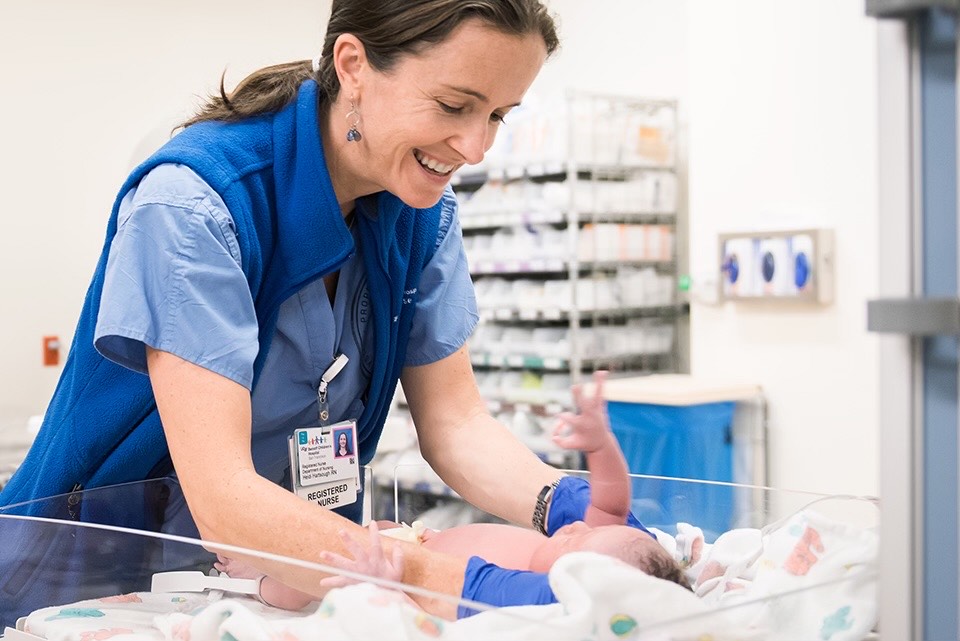
“When I start my 13-hour shift at the hospital, I just jump in, doing, doing, doing, and there is no check-in or space to just be. My job is doing all the time.”
“At ZCP it’s simply about being. I love when I put on my lanyard that says Volunteer, and I can enter a room and offer my presence. These experiences complement one another, and I have grown from being a nurse and a volunteer,” Heidi continues.
Her journey to ZCP started at a young age with parents who instilled in her the value of giving back to her community. The daughter of Quaker parents, Heidi grew up in San Francisco.
“I know that my childhood and how I was raised were hugely influenced by service. My parents saw everyone as equal, and I learned early that a person should show up to be all that they can be,” she explained.
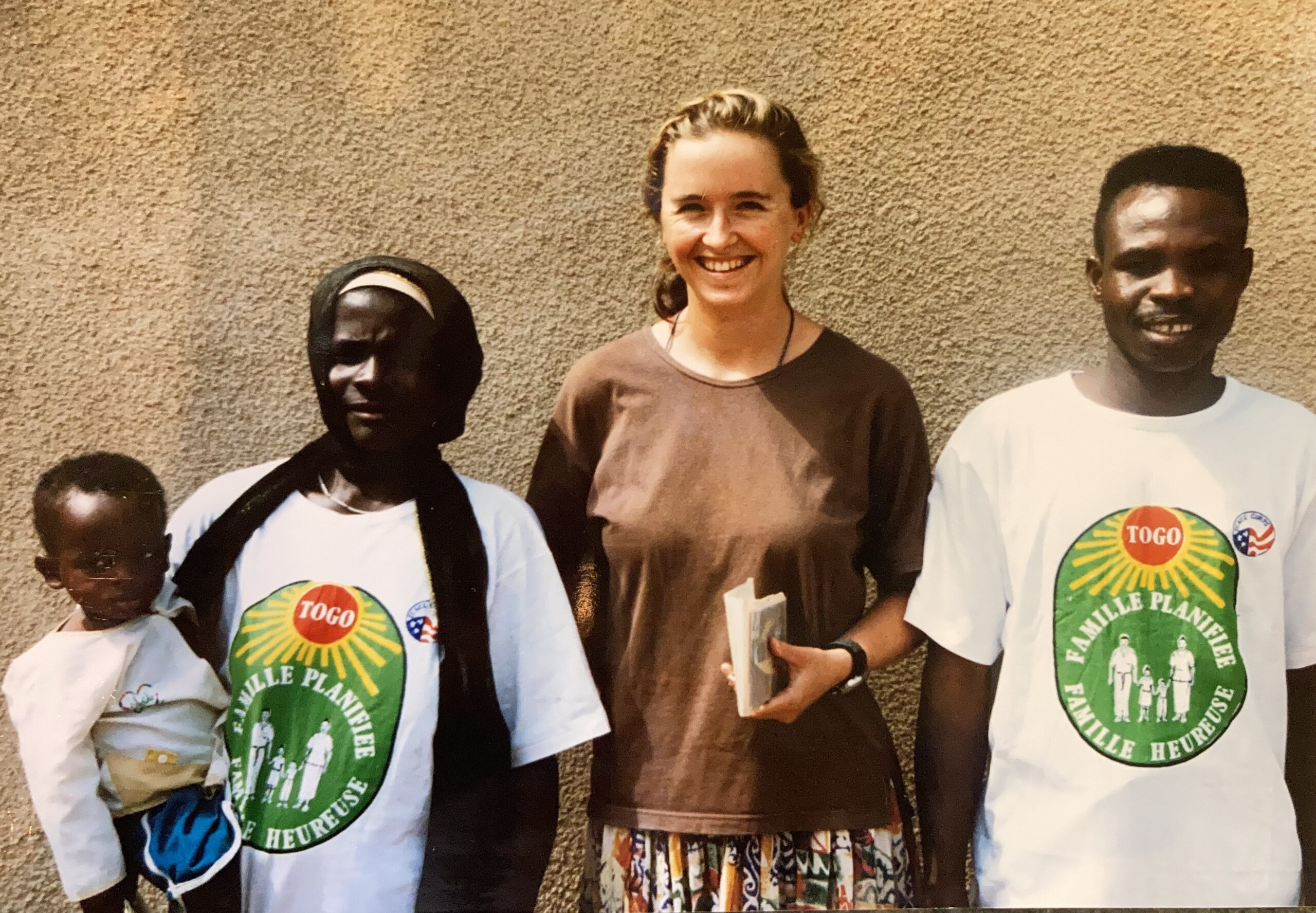
Indeed, Heidi showed up early for service when she followed in her mother’s footsteps and joined the Peace Corps after studying public health in college. She spent three and a half years in Kouloumi, Togo in Western Africa, a small village located between Ghana and Nigeria. It was there, living with a midwife and working with the villagers, that she felt called to be a nurse with a focus on women and maternal health.
“The traditional way in which death and birth were held in Togo and how death was so accepted as a part of existence made a huge impression on me. We don’t talk about stillbirth, neonatal loss, or infant birth in America,” she explained.
In Africa, when asked the question, “ ‘How many children do you have?’ The answer was always followed by, “Oh, I have eight children and three are living.”
That was an answer she’d never heard before in America. “The traditional way in which death and birth were held and how death was so accepted as a part of existence made a huge impression on me,” she said.
Like many professionals with children, Heidi began to find a few extra hours available each week as her children grew older. She knew she wanted to do meaningful volunteer work, and that’s how she came across the Zen Caregiving Project.
“My parents were getting older, and I wanted to explore how I could gain more experience and knowledge as a mother and a daughter,” she said. “It felt amazingly natural as a labor and delivery nurse and my desire for service to volunteer with an organization like ZCP.”
At Laguna Honda Hospital (LHH) in their palliative care ward, Heidi was struck by the fact that we are all just human beings sitting together with stories to tell.
“To be in community with one another, to be in the presence of someone else even when we don’t communicate, is powerful,” she explained. “We are meant to practice loving kindness with one another, and this work has made me a much more grounded person and keen to sit with curiosity and patience to see what unfolds in everyday interactions.”
“As volunteers, we are present at our most vulnerable with those who are at their most vulnerable; we should not shy away from that,” she continues.
Heidi surprised herself early on after leaving her volunteer shift at LHH. “Each time I left my shift at Laguna Honda, I felt energized and connected even when someone had just died. The way death was framed in my Peace Corps days influenced this,” she said.
“We need to talk about death more often,” Heidi said. And at Zen Caregiving Project that’s exactly what she does.
On the wall behind Heidi, there is a painting of four blue hands with white dots on them. They appear to be hands raised as if waiting their turn to be next. “Come Heidi, sit with me. Be with me,” the art suggests.
May we all be fortunate enough to have a Heidi by our side when our time comes.
If you like what you read, please join us and enroll in one of our courses, share our work with someone you think will benefit from it, or support us through a donation.
Loretta Lowrey’s Practice As Service to Others
Thirty years is a long time to be in a relationship with anyone, let alone with an organization that you volunteer for. Loretta Lowrey arrived at Zen Caregiver Project (then known as Zen Hospice Project) as a volunteer in 1992, and while she stepped away during a few child-raising years and then again during her busy career years, Loretta has always found herself being called back to the organization in one way or another.
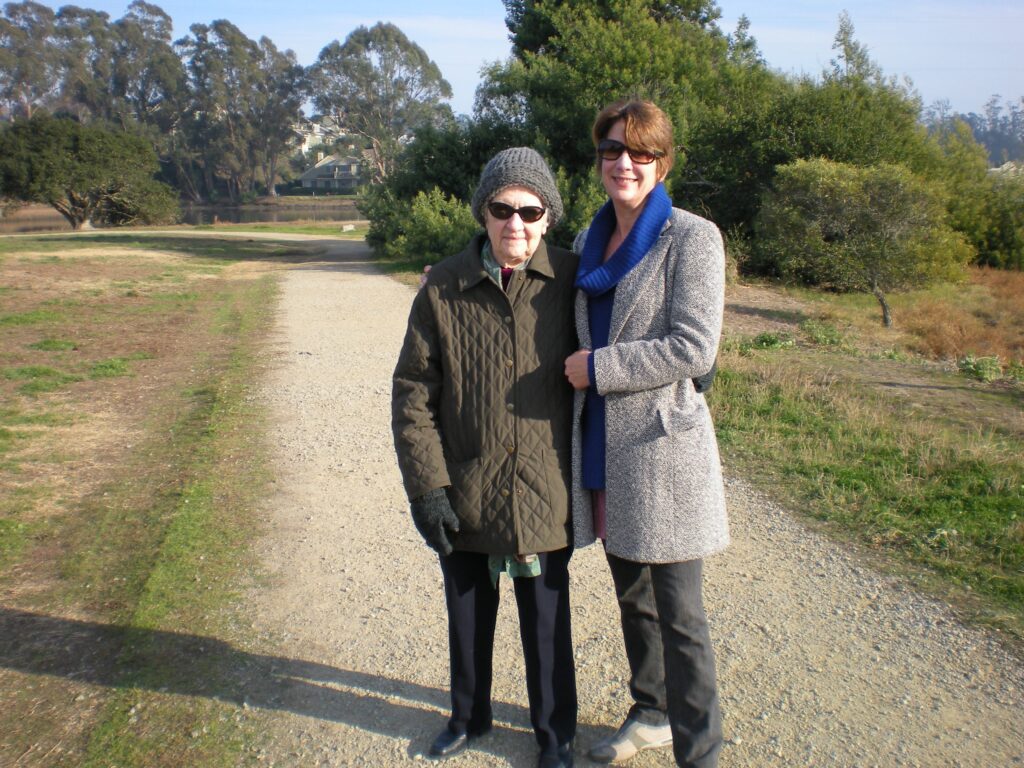
She came to Zen Caregiving Project (ZCP) in the middle of the AIDS epidemic when even the word ‘hospice’ was new to her.
“Suddenly, everyone in my world was talking about it—the woman who took care of my daughter, my sister, a museum curator that I worked with,” Loretta said. “When something presents itself to me three or more times, I pay attention to it.”
Paying attention is exactly what she did by volunteering at Laguna Honda Hospital as a Zen Caregiving Project caregiver. She continued in that role for five years until her second child turned two years old; she then stepped away to spend more time with her children. Because of her background in nonprofit management and development, Loretta continued to stay active with the organization by occasionally helping with events and development support. Over those years of being a full-time mom and employee, Loretta lost touch with ZCP for a while.
In 2013 when Loretta was looking forward to retirement, she decided it was time to return.
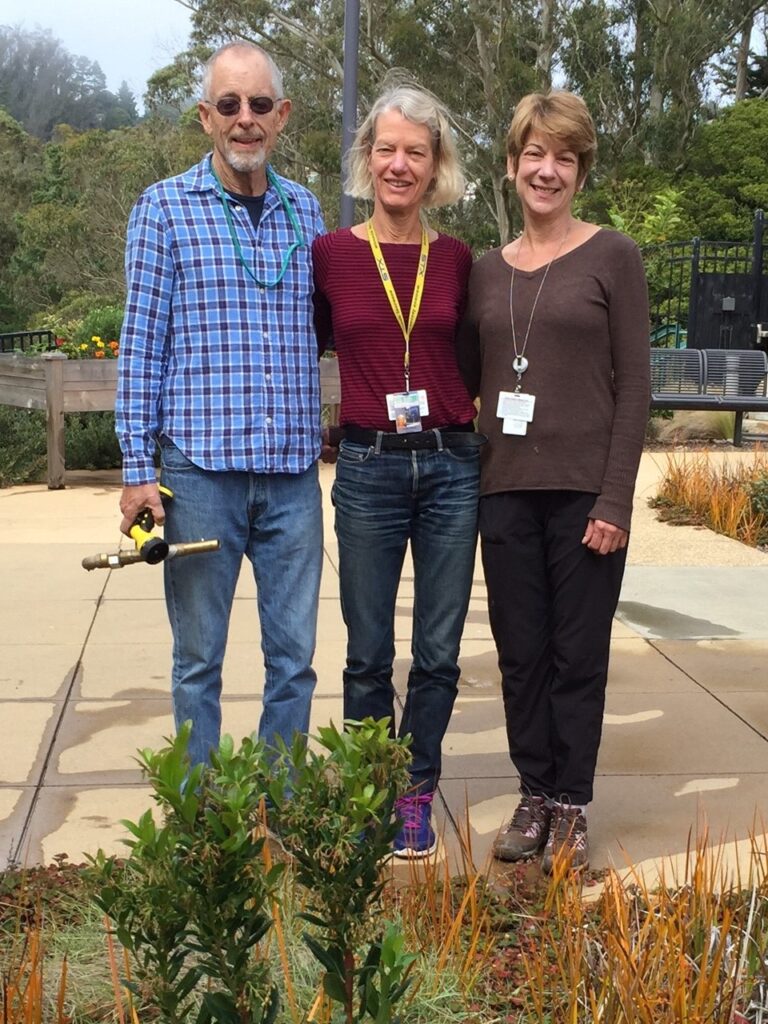
It felt like coming home,” she said. “When I returned to Laguna Honda Hospital (LHH) as a volunteer, it felt so familiar and lovely to be a part of that again. We all live in these self-created bubbles and the greatest impact for me has been meeting the range of people who have invited me into their lives and into their hearts.”
Observing the frailty and resilience of the residents is what continues to open Loretta up to becoming more compassionate and open-hearted.
“It’s given me perspective on what is truly important. Volunteering at the hospital and being with residents is so real. So many other things that seemed important before dropping away. It motivates me to live more fully by being exposed to illness and death and having it normalized,” Loretta said.
One of the residents who made an impact on Loretta was a woman who used a device to speak. The only way that she could communicate was by typing out words and since it was difficult to use her hands, it took a long time for her to have “a conversation.”
“I was so taken aback that it was such an effort to communicate, yet she would say things like ‘That’s such a pretty dress.’ We laughed and cried together while completing a legacy project that was important to her.”
During the pandemic, Loretta became a Mindful Caregiving Education (MCE) instructor for ZCP. She now teaches some of the MCE courses and still sits with residents at LHH. Through the years and through her various roles with ZCP, Loretta has become more aware of herself.
“One thing I am able to notice is when I’m acting out a role or when I have my armor on. The training we’ve had to sit at the bedside with someone has made me more aware of the power of presence,” Loretta said.
“I really think of this work as part of my practice. I think of service as seeing the wholeness in others. I thought I’d be coming to this work to give something, but in fact, I take away so much more than I give.
“Many of these residents are living fully in spite of their illness or condition,” Loretta said. “They are such a gift to me.”
And Loretta, like all our volunteers, is a gift to us at Zen Caregiving Project.
If you like what you read, please join us and enroll in one of our courses, share our work with someone you think will benefit from it, or support us through a donation.
Bob Stumpf, ZCP Volunteer since 2016
Bob Stumpf is prepared to go the distance whether it’s in a relationship with others or on a run. He’s completed 28 marathons and these days, Bob often comes in first or second in his age group. (Don’t tell anyone that at 74 years of age, Bob generally competes against only one or two others in his age category).
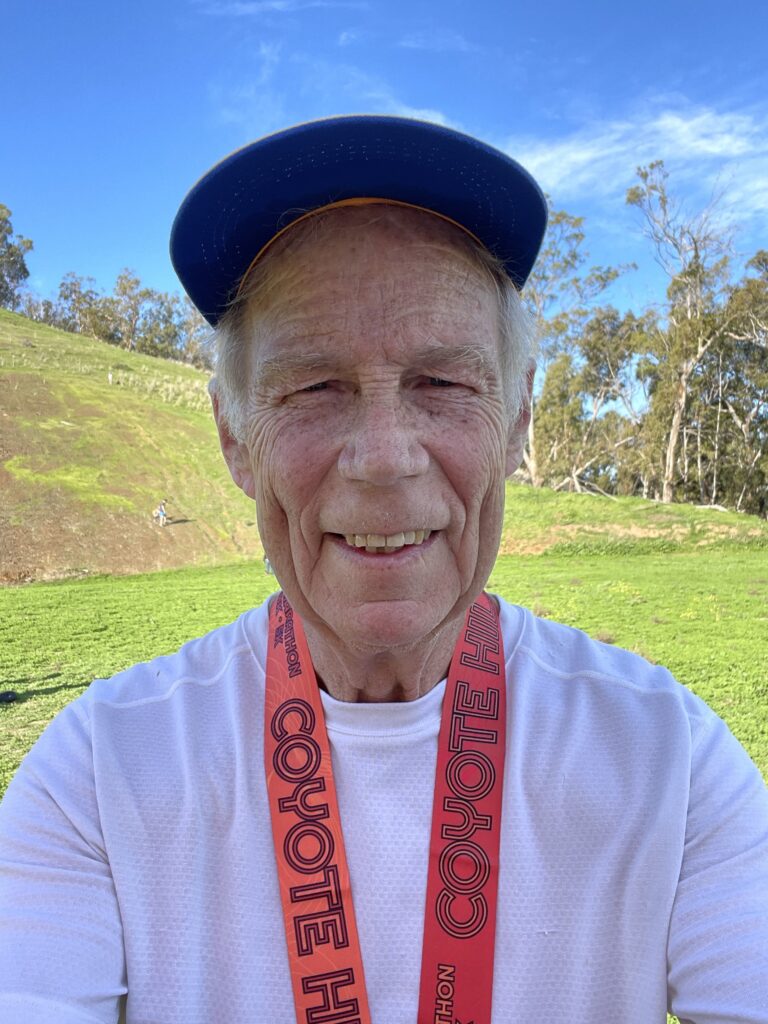
As a volunteer with Zen Caregiving Project (ZCP) for nearly six years, Bob sits with residents at Laguna Honda Hospital every Friday afternoon. One particular resident continues to enrich Bob’s life even though this person has since died.
“There was a resident at Laguna Honda that I visited weekly,” Bob explained. “I would save him for last because I knew it would be an uplifting experience for me at the end of my day.”
Bob explained that he loves sports and thought he knew everything there was to know until he met S, that is. “S. knew everything there was to know about sports, everything. He and I also bet on sporting events, usually hundreds of thousands of dollars at a time, with play money. I think he still owes me some money,” Bob said with a grin.
“Sports were a common bond from the beginning, and S. had also visited my hometown in Southern Indiana, so he understood where I came from,” Bob said. “It wasn’t just me taking care of him; it was S. taking care of me.”
That’s one aspect that surprised Bob about being a volunteer – how much he would get back from it.
“Not only have I gotten close to the residents I sit with, but I’ve developed close, personal relationships with other volunteers. During our shift change meetings, I find myself getting to know other volunteers who are very different from me, and yet we are kindred spirits,” Bob said.
“I didn’t expect that whatever calls people to do this work would give me the opportunity to meet so many other like-minded folks. We’re a real community.”
As a left-brained attorney for more than 40 years, Bob surprised himself by recognizing that he can also be a right-brained kind of person. When he turned 65 years old, he wanted to scale back his work and increase his volunteerism. While he had been on a number of charitable boards over the years, he found himself drawn toward volunteer work that would give him a one-to-one connection.
“I’ve always been interested in the concept of death; not in any kind of morbid way, but in the sense that we are born, we live, and then we die.”
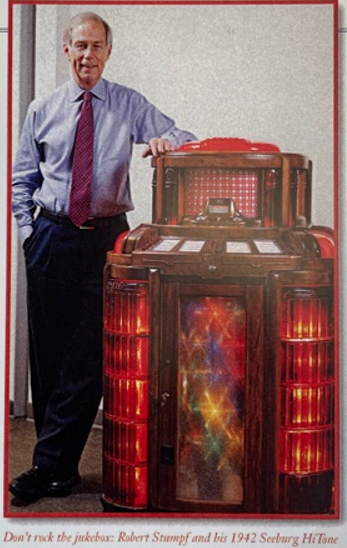
Bob is also interested in music; specifically, he has a penchant for collecting jukeboxes. He once had 22 jukeboxes in his office that are now at home with so many others that he doesn’t divulge the total number. There’s one behind him as we talk, lit up and ready for any song to be played.
“They all work,” he explained. After he purchases them, he sends them to someone who restores and fixes them for him and then delivers them wrapped up in such a way that Bob feels like it’s Christmas morning every time one arrives.
He feels that same joy when he leaves his shift at Laguna Honda.
“I get so much more out of volunteering than I put into it,” Bob said. “When 6 p.m rolls around on Friday, I’m always at my happiest as I’ve been all week. During my shift, I’m able to get out of my own head. It’s a cleansing and nourishing experience.”
“I’m more sensitive now to the importance of having relationships with people who are really not like me at all,” Bob said.
One such resident that Bob has met could not be more different. Bob has had many advantages as a white man who attended Harvard, whereas E. had a very different life as a black man in America who for many years lived on the streets. Bob and E. have met weekly since December 2016, and they have forged a strong relationship.
“He’s important to me,” Bob explained. “ We aren’t family; we aren’t best friends, but we get together weekly, and he’s my friend. When I leave, he usually says, ‘Be safe out there.”
Bob looks off into the distance and returns to thoughts of his friend, S. who died last year.
“I saw him for almost two years,” he said, “and every time I walk by his room at Laguna Honda Hospital, I think of S. I miss him.”
Bob hasn’t just run 28 marathons. He’s running a marathon with residents at Laguna Honda, and rest assured, he’ll go the distance with them not to win any kind of medal, but to just be present on their journey. “People can have almost nothing left, and they are still living their lives,” Bob said. Yet they still have Bob, holding their hand and offering his presence. And often, at no extra charge, he offers them a few jokes.
If you like what you read, please join us and enroll in one of our courses, share our work with someone you think will benefit from it, or support us through a donation.

